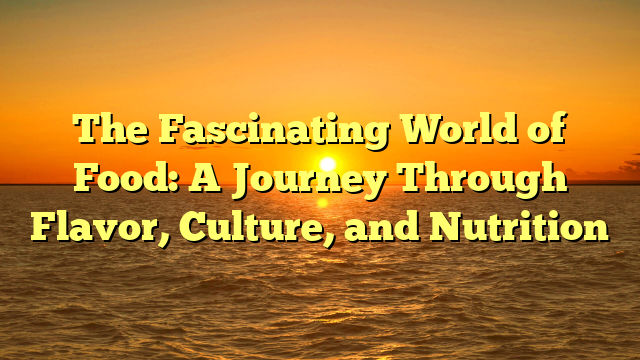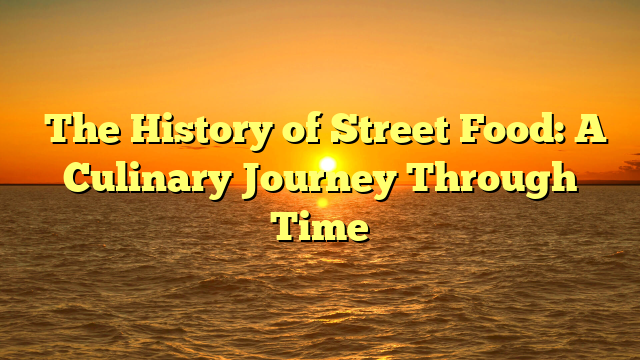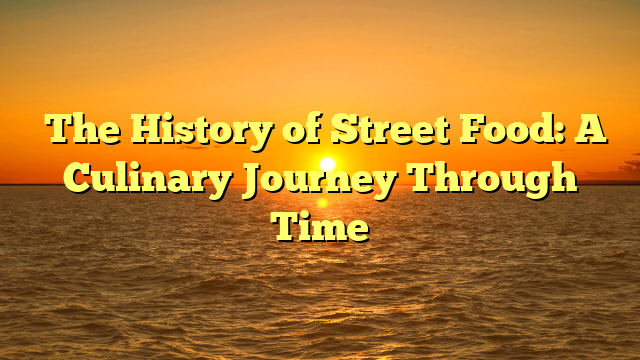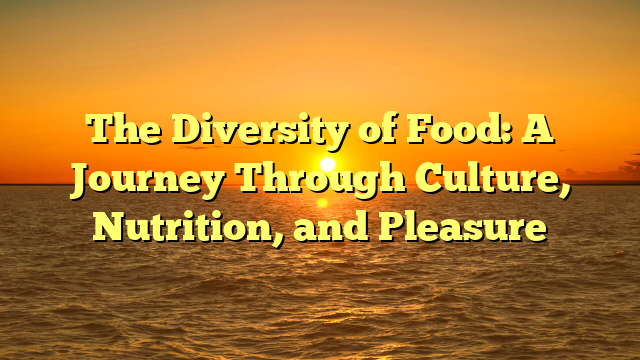
Food is more than just a necessity; it’s an experience, a celebration, and an integral part of
human culture and history. From the comfort of a home-cooked meal to the exotic flavors of
international cuisine, food serves as a bridge between people, places, and traditions. Over
time, food has evolved from simple sustenance to a complex reflection of human creativity,
culture, and technological advancements. Let’s explore the fascinating world of food,
examining its role in our lives, the diversity of flavors it offers, and its importance to our
health.
A Historical and Cultural Connection
Food is deeply rooted in history and culture. Throughout the centuries, different civilizations
have developed unique ways of preparing and consuming food, influenced by geography,
climate, and available resources. The ancient Egyptians, Greeks, Romans, and Chinese
were some of the first to document culinary traditions, laying the foundation for modern
cuisine.
In medieval Europe, the use of spices was a symbol of wealth and social status. Spices like
cinnamon, saffron, and cloves were highly prized and transported from far-flung regions of
Asia, Africa, and the Middle East. This early global trade in food ingredients helped form the
culinary exchange that continues today. The Columbian Exchange in the 15th and 16th
centuries, which involved the transfer of foods like potatoes, tomatoes, and corn between the
Americas and Europe, changed the world’s palate forever.
Food is also an essential part of many cultural and religious rituals. In Hinduism,
vegetarianism is promoted, with many celebrating the diversity of plant-based foods. In the
Middle East, sharing a meal of falafel, hummus, and pita bread is a cultural tradition that
brings families and friends together. Festivals such as Thanksgiving in the United States or
Lunar New Year in China center around the preparation and enjoyment of special foods,
reinforcing the importance of food in fostering community and celebrating traditions.
The Science of Food: Nutrition and Health
Food is not just a source of pleasure; it is essential for survival and well-being. The nutrients
we consume from food provide energy, promote growth, and protect our bodies from illness.
A balanced diet, rich in vitamins, minerals, protein, and fiber, supports bodily functions and
strengthens the immune system.
The science of food and nutrition is constantly evolving, with new research helping to
uncover the intricate relationship between what we eat and our overall health.
Carbohydrates, proteins, fats, vitamins, and minerals each play vital roles in maintaining
health. For example, carbohydrates provide energy, while protein is necessary for muscle
repair and growth. Healthy fats are essential for brain function, and vitamins and minerals
help regulate processes such as immune function and bone health.
A growing body of research has also highlighted the link between food and mental health.
Diets rich in fruits, vegetables, and whole grains have been shown to improve mood, reduce
the risk of depression, and boost cognitive function. The gut-brain axis, which refers to the
connection between the digestive system and the brain, has become a focus of scientific
inquiry, revealing how our diet can influence mental well-being.
However, food choices can also have negative health consequences. The modern diet, often
laden with processed foods, added sugars, and unhealthy fats, is a significant contributor to
the rise in chronic diseases such as obesity, diabetes, and heart disease. These conditions
are preventable through better dietary choices, and health experts encourage people to
focus on whole, nutrient-dense foods rather than relying on heavily processed or fast food
options.
rimba slot of Food
One of the most exciting aspects of food is its diversity. Around the world, there are endless
varieties of dishes, each with unique flavors, ingredients, and cooking techniques. From the
bold spices of Indian cuisine to the delicate sushi of Japan, food offers a rich tapestry of
experiences that reflect the geography, history, and culture of its region of origin.
Italian cuisine, for example, is renowned for its emphasis on fresh, seasonal ingredients
such as tomatoes, olive oil, and basil. Dishes like pasta, pizza, and risotto have become
global favorites, but they are deeply connected to the Italian way of life. Similarly, Mexican
food is characterized by its vibrant use of chilies, beans, and corn, with dishes such as tacos
and enchiladas offering a combination of textures and flavors that have made Mexican
cuisine one of the most beloved in the world.
Asian cuisine offers a broad spectrum of flavors and techniques. In China, stir-frying,
steaming, and braising are common cooking methods that preserve the natural flavors of
ingredients while creating a harmony of taste. Korean cuisine is famous for its fermented
foods like kimchi, which provide both flavor and health benefits. Indian cuisine, with its
diverse regional variations, is known for its rich use of spices, offering an explosion of flavors
in every dish.
Food also plays a significant role in fusion cuisine, where culinary traditions from different
cultures are combined to create innovative dishes. The fusion of French and Japanese
techniques, for instance, has led to the creation of dishes like sushi with foie gras, while the
blending of Asian and Latin American ingredients has given rise to dishes like Korean BBQ
tacos.
The Future of Food: Sustainability and Innovation
As the global population grows and the demand for food increases, the future of food will
undoubtedly face challenges. Sustainability and food security have become critical issues in
modern society, with the need for more efficient and eco-friendly agricultural practices
becoming increasingly apparent.
Farm-to-table initiatives, vertical farming, and plant-based diets are some of the solutions
that are gaining traction. Sustainable farming practices, such as organic farming and
regenerative agriculture, aim to reduce environmental impact while providing healthy food for
communities. The rise of plant-based proteins, such as Beyond Meat and Impossible Foods,
is another example of innovation aimed at reducing the environmental footprint of food
production.
Technology is also playing a significant role in shaping the future of food. Lab-grown meat,
3D-printed food, and advances in food preservation are all part of a rapidly changing food
landscape. These innovations have the potential to address food shortages, improve
nutrition, and reduce the strain on natural resources.
Conclusion
Food is a central part of life, influencing our culture, health, and environment. From its rich
historical significance to its impact on modern nutrition and innovation, food connects us all.
As we continue to explore the vast diversity of culinary traditions and innovations, food will
undoubtedly remain a cornerstone of human civilization, shaping the way we live, eat, and
share with one another. Whether we’re savoring a traditional family recipe or experimenting
with cutting-edge culinary techniques, food will always be a source of enjoyment,
nourishment, and connection.




